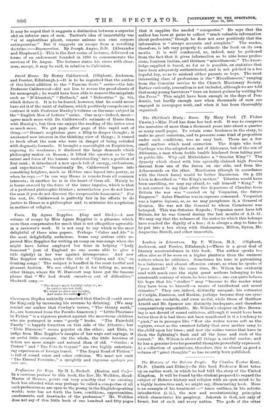The Children's Study : Rome. By Mary Ford. (T. Fisher
Unwin.) —Miss Ford has done her task well. It was to compress the narrative of more than a thousand years into about a quarter as many small pages. To retain some freshness in the story, to make no great omissions, and to preserve some kind of proportion under such conditions, was no easy task. There are a few small matters which need correction. The Scipio who took Carthage was the adopted son, not of Africanus, but of the son of Africanus, a man whom feeble health hindered from taking part in public life. Why call Mithridates a "Grecian King "? The dynasty which closed with him specially claimed high Persian descent from one of the Seven on one side, and from the Achaemenids on the other. Massinassa (though in accordance with the Greek form) would be better Massinissa. On p. 224 Livia is described as "the King's mother." Tiberius would have been unwilling, we may say afraid, to call himself " King." It is not correct to say that after the departure of Claudius from Britain the war was " carried on by Vespasian, the future Emperor." Aulus Plautius was in supreme command. Vespasian was a legatus legionis, or, as we may paraphrase it, a General of division. He was not the General to whom Caractacus was betrayed. This was Ostorius Scapula; Vespasian must have left Britain, for he was Consul during the last months of A.D. 51. We may say that the volumes of the series to which this belongs have reached the dignity of a box ; it is always a step to fame to be put into a box along with Shakespeare, Milton, Byron, Mr. Augustine Birrell, and other immortals.


















































 Previous page
Previous page